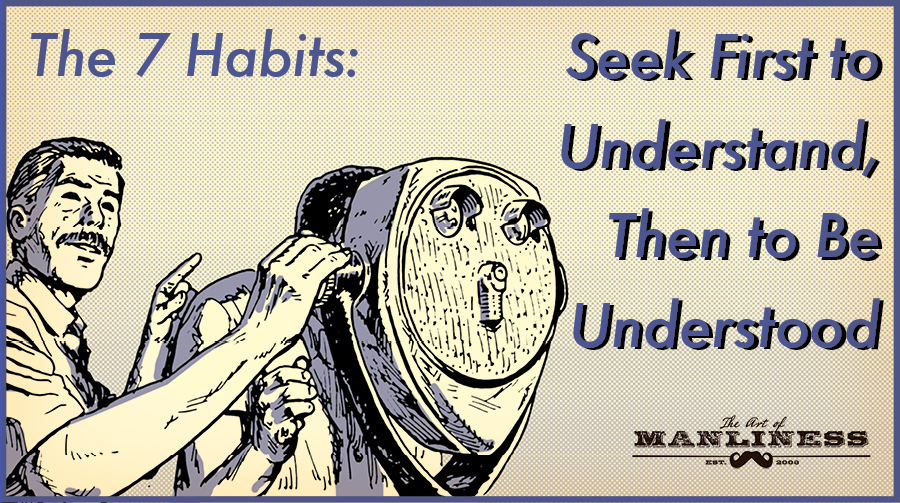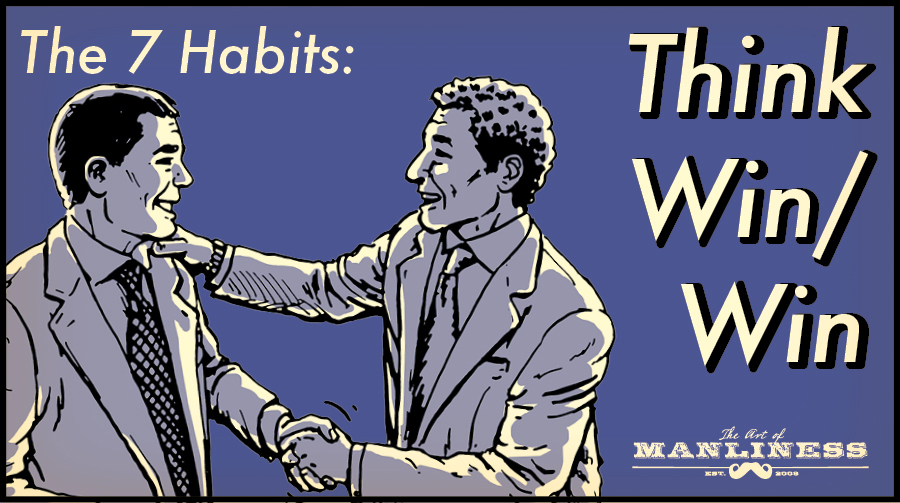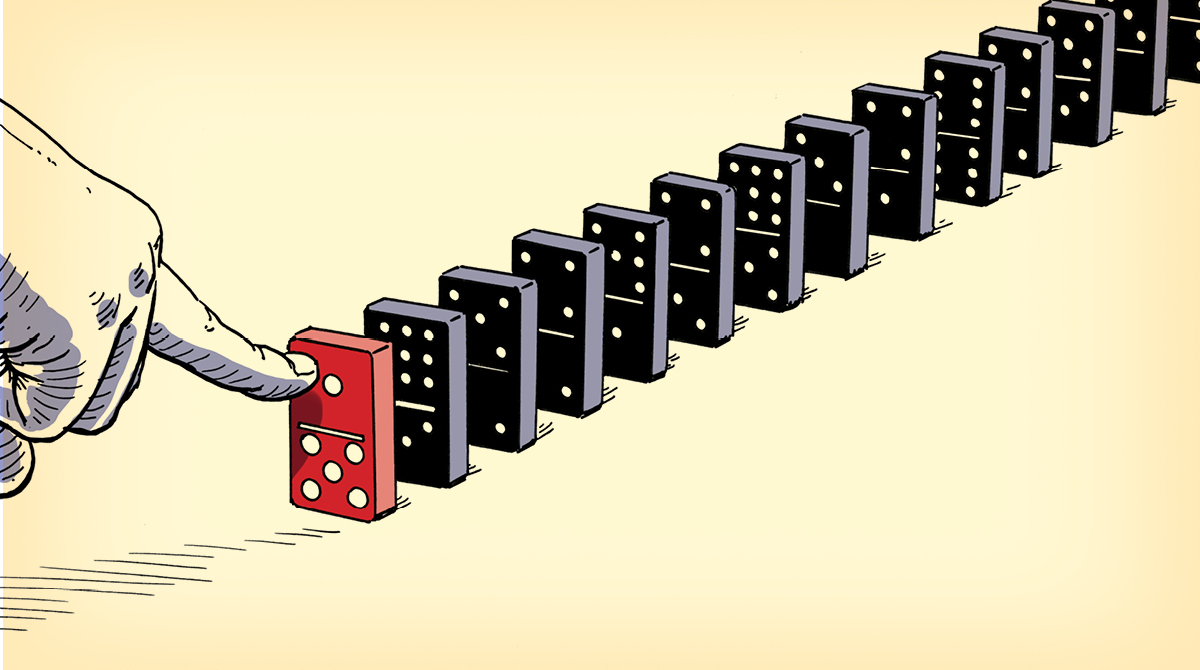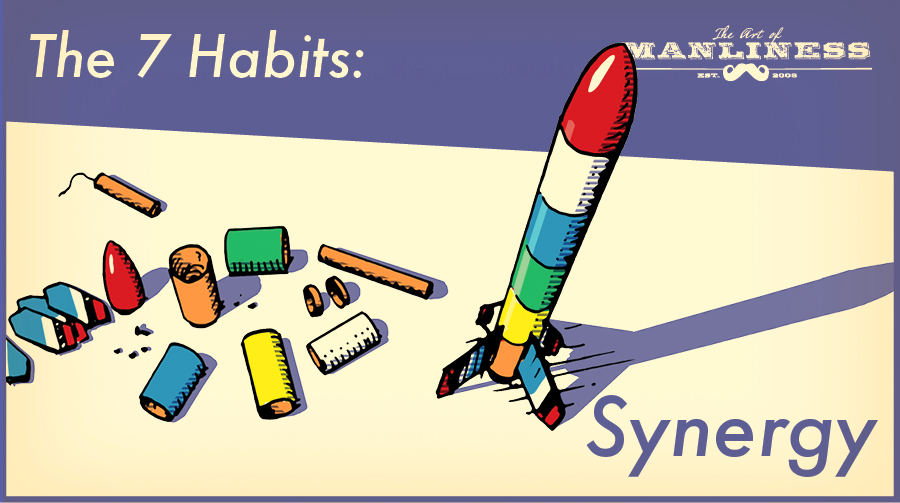
Welcome back to our monthly series that summarizes, expands, and riffs on each of the seven habits laid out in The 7 Habits of Highly Effective People by Stephen Covey.
Last time, we discussed the first of what Stephen Covey calls the “public habits” — Habit 4: Think Win/Win. The gist of that habit is to seek to allow everyone involved in a conflict or negotiation to feel as if they’ve “won.” This requires balancing consideration for the needs of others, with the assertiveness to stand up for your own. For Covey, this combination of consideration and assertiveness is what gives rise to maturity.
Habit 5 — “Seek First to Understand, Then to Be Understood” — helps us develop the consideration side of the equation.
We humans are actually pretty dang good at this habit — at grasping what’s going on in the minds of others. In fact, our ability to process a host of obvious and subtle cues in order to attribute mental states (like thoughts, feelings, and beliefs) to others, and thus predict and explain what they are thinking, is one of the things that separates us from other animals. Cognitive scientists call this ability “theory of mind” because when we interact with others, it’s impossible for us to know exactly what they’re thinking/feeling/perceiving, so that we have to construct a theory of what’s going through their heads. Without theory of mind, social interaction would be awkward, clumsy, and nearly impossible.
Think about all the instances in your daily life in which you have to construct a theory on what’s going through the mind of someone else. You do so when you ask your wife how her day was and she exasperatedly says “Fine.” You guess that her day actually wasn’t fine, and so respond by saying: “It sounds like you had a rough day. Tell me what happened.”
You use your theory of mind when you make a sales pitch to a potential client. You watch how they react to certain talking points, and postulate as to what’s holding them back from pulling the trigger.
Theory of mind is what allows humans to cooperate so effectively that we’ve become the dominate species on Earth and have even stepped foot on the moon. Take that chimpanzees!
So if we’re pretty good at understanding others, why did Covey think it was necessary to devote an entire habit to the subject?
Well, while we’ve been endowed with a fairly deft ability to understand the minds of our fellow human beings, that ability is still subject to some innate biases that sometimes muddle our perception. And when there’s a failure of understanding, a whole host of problems pop-up: couples argue and bicker, children feel estranged from parents, toxic cultures develop inside companies, and countries go to war.
So while we’re generally good at understanding others, we can’t take that ability for granted. We have to be mindful of the ways our theory of mind can go astray.
Why We Fail to Understand Others & How to Rectify These Mistakes
Social psychologist Nick Epley has spent his career trying to figure out why we misunderstand others. He highlighted his research in a reader-friendly book entitled Mindwise: Why We Misunderstand What Others Think, Believe, Feel, and Want. (I interviewed Juliana Schroeder, one of Nick’s research assistants, on the podcast a few years ago. Take a listen if you haven’t already. It’s a good rundown of his findings.)
According to Nick, our mistakes about what others are thinking “come from the two most basic questions that underlie any social interaction. First, does ‘it’ have a mind? And second, what state is that mind in?”
I Have a Rational, Human Mind, But That Idiot Doesn’t
As to the first question, you’re probably thinking “When would I ever think that someone else I’m interacting with doesn’t have a mind?” According to Nick’s research, however, you engage in a form of this thinking quite a bit. He calls this failure to fully recognize the human mind of another “dehumanization.” The most extreme form of dehumanization, of course, would be genocide. Instead of seeing victims as fellow human beings, the executioners see them as dirty animals or pests that need exterminating.
While the vast majority of us will never take part in mass genocide, we all fall prey to dehumanizing others in more subtle, everyday ways. The most common way we do this is by assuming others’ minds are less sophisticated than our own. For example, Nick’s research has shown that affluent people tend to think that poor people lack self-control, free will, and initiative. On the flipside, poor people have a tendency to believe that rich people are unfeeling, callous, money-grubbing robots. In both cases, each group assumes the minds of the other group aren’t as human as theirs.
Other research has shown that while business managers say they work for intrinsic motivations like improving the lives of their customers, these same managers often assume their employees are solely working for the money. Employees on the other hand, often think their managers are heartless taskmasters. Again, you’ve got one group assuming that the other isn’t as human.
Our current political climate is partly the result of members of different political parties dehumanizing each other. People subconsciously assume that those on the opposite side of the aisle are stupid, immoral, and out of touch with reality.
Or take driving. As George Carlin famously mused, “Have you ever noticed that everyone driving slower than you is an idiot, and anyone going faster than you is a maniac?” In both instances, you assume you’re the rational human, while everyone else on the road is a mindless dolt or an inconsiderate jagweed. And the funny thing is, those jagweeds are probably thinking the same thing about you.
Why do we do this? Our brains are just wired to react this way when we think that someone seems different from us — either physically or psychologically. The part of our brain that lights up when we engage in theory of mind — called the medial prefrontal cortex (MPFC) — lights up particularly strongly when we’re “reading” the mind of someone close to us (again, either physically or psychologically). Conversely, the more literally or metaphorically distant someone seems, the less the MPFC engages, which results in us thinking that person is less than fully human. When a boss interacts with an employee or an employee interacts with a boss, they recognize a difference between themselves, so both will tend to dehumanize the other, ever so slightly.
Our tendency to dehumanize others who aren’t “close” to us contributes to the dismal state of online discourse. When you tweet at someone, they’re likely hundreds or thousands of miles away from you; you can’t look them in the eyes or read their facial expressions. Instead of a human, they’re just some online avatar. So you don’t think twice about telling them how despicable they are.
Failing to see the full humanity of someone would obviously get in the way of understanding them; if you begin the interaction assuming there’s no mind there to understand (or that it’s quite impoverished compared to yours), you’ll just blow them off entirely.
How to Overcome the Tendency to Dehumanize
Overcoming our natural tendency to “other” others is pretty straightforward. Instead of focusing on what makes you different from them, focus on what you have in common. As soon as you start seeing the similarities between you and another person, your MPFC will begin lighting up more, and you’ll find yourself increasingly understanding them as fellow human beings.
The thing that really lights up our MPFC is when we’re in close physical proximity to others and interact with them in face-to-face conversations; doing a physical activity together helps build interpersonal cohesion as well.
So if you’re a boss and you catch yourself thinking your employee is just doing enough work to get paid, remind yourself that he likely got into this field for the same reason you did and has an interest in it outside a paycheck. To really light up that MPFC, go have lunch together, or play a round of golf.
Or when you’re out driving in rush-hour traffic, and you catch yourself thinking you’re surrounded by idiots and maniacs, practice your humanizing ability by reminding yourself that your fellow drivers are probably trying to get home to their families — just like you are. You’d want others to cut you some slack, so cut them some slack too.
If you’re tired of the rancor of online discourse, spend less time in digital space interacting with avatars, and more time in “meat space,” interacting with other minds, the cogs of which you can see working in real time.
On a related note, don’t have serious arguments with your significant other over text message — the distance created by this abstract form of communication will gin up the animosity.
Find common ground and preferably talk and do things with other people face-to-face.
It’s that simple.
These Glasses Work Great for Me; They’ll Work Great for You Too
All of us gaze out at the world through the eyeholes of our own personal perspective — a filter so fixed and all-pervasive that we hardly realize it exists. We no more notice it than a fish notices it’s swimming in water.
Author David Foster Wallace explained this fact well in his “This Is Water” speech:
“Everything in my own immediate experience supports my deep belief that I am the absolute center of the universe, the realest, most vivid and important person in existence. We rarely talk about this sort of natural, basic self-centeredness, because it’s so socially repulsive, but it’s pretty much the same for all of us, deep down. It is our default-setting, hard-wired into our boards at birth. Think about it: There is no experience you’ve had that you were not at the absolute center of. The world as you experience it is right there in front of you, or behind you, to the left or right of you, on your TV, or your monitor, or whatever. Other people’s thoughts and feelings have to be communicated to you somehow, but your own are so immediate, urgent, real.”
The fact that we see ourselves as the center of the universe gets at the second question we subconsciously ask ourselves when interacting with another person: “What state is that mind in?”
The answer we give this question — subconsciously but quite assuredly — is, “A similar state to my own.”
Because most of our thoughts are about ourselves and we spend every waking minute marinating in these literally self-centered thoughts, we have a tendency to assume that other people perceive and process the world the same way that we do. We typically don’t consciously realize this until we have a super salient epiphany moment that unveils the fact that someone else thinks in a fundamentally different way. Even once you’ve had such an experience, you still sometimes slip into assuming that other people’s minds are very much like your own. Epley calls this “the lens problem.”
One problem with our egocentric lens, is that it can get in the way of our ability to communicate; you may think that someone should naturally understand something, because you can understand it quite well in your own mind.
To grasp this issue, think of the “tapping” game you may have played as a kid. You tap out a song and have your friend guess what it is. When you do the tapping, the taps sound just like the song—melody and all—that you can “hear” in your head, so that you feel your buddy should be able to easily recognize it. But your friend just hears a bunch of taps that all sound the same. So he guesses wrong, and you’re baffled, because the fact you were tapping out “The Power of Love” by Huey Lewis and the News was so very obvious.
Another issue with our inability to recognize that we view the world through a personal lens, is that instead of seeking to understand how someone else is seeing things, we try to solve their unique issues by applying our own framework to them.
Covey gives a metaphor for this lens problem, by using the example of literal lenses:
“Suppose you’ve been having trouble with your eyes and you decide to go to an optometrist for help. After briefly listening to your complaint, he takes off his glasses and hands them to you.
‘Put these on,’ he says. ‘I’ve worn this pair of glasses for ten years now, and they’ve really helped me.’
‘This is terrible! I can’t see a thing!’ you exclaim.
‘Well, what’s wrong?’ he asks. ‘They work great for me. Try harder.’
‘I am trying,’ you insist. ‘Everything is a blur.’
‘Well, what’s the matter with you? Think positively.’
‘Okay. I positively can’t see a thing.’
‘Boy, are you ungrateful!’ he chides. ‘And after all I’ve done to help you!’”
Would you go back to such an optometrist? Certainly not. He didn’t even try to understand how you saw the world and just assumed what worked for him would work for you; as Covey puts it, he prescribed before he diagnosed.
You wouldn’t want that kind of guy for an optometrist, and people don’t want that kind of guy as a friend, co-worker, or husband either. If you really want to understand people, you can’t assume they see things through the same lens you do, and you can’t solve their problem by trying to make them look through it too; you have to get a grasp of how they see things, and then tailor your approach accordingly.
How to Overcome the Lens Problem
Overcoming the lens problem takes a lot of self-awareness and a lot of intentionality.
First, recognize that you have a tendency to understand people through your own egocentric lens. Instead of assuming that you’ve got a good handle on someone, because they think pretty much like you do, assume that they’re seeing the world differently.
Second, instead of trying to fit their perspective into your own, try to understand it the way they themselves do.
How do you do that?
You ask questions.
So simple, yet we often don’t do it because we’re overly confident in our ability to understand what others are thinking and what they need. We want to tell, when we really need to listen.
Avoid asking “why” questions, though. Why? Because most people don’t actually know why they do the things they do or like the things they like. They think they do, but they’re likely speculating or following some narrative that’s become distorted and embellished. At the same time, asking “why” questions can make people feel defensive, since, no matter how well-intended, they tend to come off as criticism, as relationship expert Dr. John Gottman observes:
“When you ask, ‘Why do you think like that?’ the other person is likely to hear, ‘Stop thinking that, you’re wrong!’ A more successful approach would be, ‘What leads you to think that?’ or, ‘Help me understand how you decided that.’”
So focus on who, what, when, where, and how instead. Those questions will likely give you some great information to help you better understand the mind of another person.
After you’ve asked a question, shut up and really listen. We’ve published an entire series on how to listen better. Go read those articles and implement the insights there.
Still don’t understand the person? Ask more questions.
Perspective getting takes work and time. But it’s well worth the effort.
By seeking first to understand, you’ll be in a better position to find Win-Win solutions to interpersonal problems, the trust in your relationships will increase significantly, and your circle of influence will expand in turn.
See how all these habits work synergistically? Which is a nice segue to the next habit in the series . . . Synergize.
Be sure to listen to my podcast with Stephen’s son about his father’s famous principles:
Read the Whole Series
- Be Proactive, Not Reactive
- Begin With the End in Mind
- Put First Things First
- Think Win/Win
- Seek First to Understand, Then to Be Understood
- Synergy (Beyond the Eye-Rolling Buzzword)
- Sharpen the Saw







